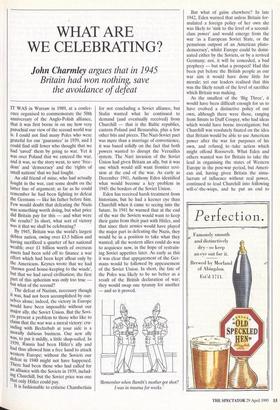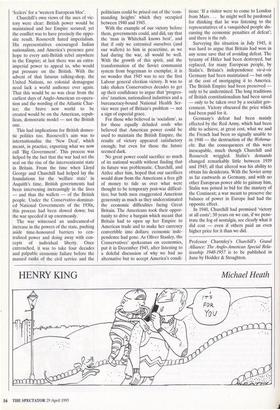WHAT ARE WE CELEBRATING?
John Charmley argues that in 1945
Britain had won nothing, save the avoidance of defeat
IT WAS in Warsaw in 1989, at a confer- ence organised to commemorate the 50th anniversary of the Anglo-Polish alliance, that it was first borne in on me how very parochial our view of the second world war is. I could not find many Poles who were grateful for our 'guarantee' in 1939, and I could find still fewer who thought that we had 'saved' them by going to war. Yet it was over Poland that we entered the war, and it was, so the story went, to save 'free- dom' and 'democracy' and the 'rights of small nations' that we had fought.
An old friend of mine, who had actually fought in the war, cast some doubt on the latter line of argument; as far as he could remember he had been fighting to defeat the Germans — like his father before him. Few would doubt that defeating the Nazis was something worth doing, but what price did Britain pay for this — and what were the results? In short, what sort of victory was it that we shall be celebrating?
By 1945, Britain was the world's largest debtor nation, owing over £3.5 billion and having sacrificed a quarter of her national wealth; over £1 billion worth of overseas assets had been sold off to finance a war effort which had been kept afloat only by the Americans. Keynes wrote that we had thrown good house-keeping to the winds', but that we had saved civilisation; the first Part of this aphorism was only too true but what of the second?
The defeat of Nazism, necessary though It was, had not been accomplished by our- selves alone; indeed, the victory in Europe Would have been impossible without our major ally, the Soviet Union. But the Sovi- ets present a problem to those who like to claim that the war was a moral victory: cru- sading with Beelzebub at your side is a morally dubious business. Our new ally Was, to put it mildly, a little shop-soiled. In 1939, Russia had been Hitler's ally and had thus allowed him a free hand to attack western Europe; without the Soviets our defeat in 1940 might not have happened. There had been those who had called for an n alliance with the Soviets in 1939, includ- ing Churchill, but the Soviet price was one that only Hitler could pay. It is fashionable to criticise Chamberlain for not concluding a Soviet alliance, but Stalin wanted what he continued to demand (and eventually received) from Churchill — that is the Baltic republics, eastern Poland and Bessarabia, plus a few other bits and pieces. The Nazi-Soviet pact was more than a marriage of convenience, it was based solidly on the fact that both powers wanted to disrupt the Versailles system. The Nazi invasion of the Soviet Union had given Britain an ally, but it was one which would still want frontier revi- sion at the end of the war. As early as December 1941, Anthony Eden identified what would become a key problem in 1945: the borders of the Soviet Union.
Eden has received harsh treatment from historians, but he had a keener eye than Churchill when it came to seeing into the future. In 1941 he warned that at the end of the war the Soviets would want to keep their gains from their pact with Hitler, and that since their armies would have played the major part in defeating the Nazis, they would be in a position to take what they wanted; all the western allies could do was to acquiesce now, in the hope of restrain- ing Soviet appetites later. As early as this it was clear that appeasement of the Ger- mans would be followed by appeasement of the Soviet Union. In short, the fate of the Poles was likely to be no better as a result of the British declaration of war; they would swap one tyranny for another — and so it proved.
`Remember when Bambi's mother got shot? I was in trauma for weeks.' But what of gains elsewhere? In late 1942, Eden warned that unless Britain for- mulated a foreign policy of her own she was likely to 'sink to the level of a second- class power' and would emerge from the war 'as a European Soviet State, or the penurious outpost of an American pluto- democracy', whilst Europe could be domi- nated either by the Soviets, or by a revived Germany; not, it will be conceded, a bad prophecy — but what a prospect! Had this been put before the British people as our war aim it would have done little for morale; yet our leaders realised that this was the likely result of the level of sacrifice which Britain was making.
As the smallest of the 'Big Three', it . would have been difficult enough for us to have evolved a distinctive policy of our own, although there were those, ranging from Smuts to Duff Cooper, who had ideas which would have borne investigation; but Churchill was resolutely fixated on the idea that Britain would be able to use American power after the war for purposes of his own, and refuse4 to • take action which might offend Roosevelt. What Eden and others wanted was for Britain to take the lead in organising the states of Western Europe in the post-war period, but Ameri- can aid, having given Britain the simu- lacrum of influence without real power, continued to lead Churchill into following will-o'-the-wisps, and he put an end to `feelers' for a 'western European bloc'.
Churchill's own views of the uses of vic- tory were clear: British power would be maintained and her Empire secured; yet the conflict was to have precisely the oppo- site result. Roosevelt hated imperialism. His representatives encouraged Indian nationalism, and America's presence gave hope to every anti-British rebel anywhere in the Empire; at last there was an extra- imperial power to appeal to, who would put pressure on the British. With the advent of that fatuous talking-shop, the United Nations, no colonial demagogue need lack a world audience ever again. That this would be so was clear from the earliest days of Anglo-American co-opera- tion and the wording of the Atlantic Char- ter; the brave new world to be created would be on the American, repub- lican, democratic model — not the British one.
This had implications for British domes- tic politics too. Roosevelt's aim was to internationalise the 'New Deal', which meant, in practice, exporting what we now call Sig Government'. This process was helped by the fact that the war had set the seal on the rise of the interventionist state in Britain. From the time when Lloyd George and Churchill had helped lay the foundations for the 'welfare state' in Asquith's time, British governments had been intervening increasingly in the lives — and thus the wallets — of the British people. Under the Conservative-dominat- ed National Governments of the 1930s, this process had been slowed down; but the war speeded it up enormously.
The war witnessed an undreamed-of increase in the powers of the state, pushing aside time-honoured barriers to cen- tralised power and doing away with con- cepts of individual liberty. Once entrenched, it was to take four decades and palpable economic failure before the massed ranks of the civil service and the politicians could be prised out of the 'com- manding heights' which they occupied between 1940 and 1945.
With the example of our victory before them, governments could, and did, say that the 'man in Whitehall knows best', and that if only we entrusted ourselves (and our wallets) to him in peacetime, as we had during the war, all would be well. With the growth of this spirit, and the transformation of the Soviet communist system from bogeyman to exemplar, it is no wonder that 1945 was to see the first Labour general election victory. It was to take shaken Conservatives decades to get up their confidence to argue that 'progres- sive' taxation, nationalised industries and a bureaucracy-bound National Health Ser- vice were part of Britain's problem — not a sign of especial grace.
For those who believed in 'socialism', as for those equally deluded souls who believed that American power could be used to maintain the British Empire, the results of victory appeared satisfactory enough; but even for those the future seemed dark.
No great power could sacrifice so much of its national wealth without finding that its future was problematic. Churchill, and Attlee after him, hoped that our sacrifices would draw from the Americans a free gift of money to tide us over what were thought to be temporary post-war difficul- ties; but both men exaggerated American generosity as much as they underestimated the economic difficulties facing Great Britain. The Americans took their oppor- tunity to drive a bargain which meant that Britain had to open up her Empire to American trade and to make her currency convertible into dollars; economic inde- pendence had gone. As Oliver Stanley, the Conservatives' spokesman on economics, put it in December 1945, after listening to a doleful discussion of why we had no alternative but to accept America's condi- tions: 'If a visitor were to come to London from Mars . . . he might well be pardoned for thinking that he was listening to the representatives of a vanquished people dis- cussing the economic penalties of defeat'; and there is the rub.
Surveying the situation in July 1945, it was hard to argue that Britain had won in any sense save that of avoiding defeat. The tyranny of Hitler had been destroyed, but replaced, for many European people, by Stalin's. Britain's independence vis-a-vis Germany had been maintained — but only at the cost of mortgaging it to America. The British Empire had been preserved only to be undermined. The long traditions of British constitutionalism had been saved — only to be taken over by a socialist gov- ernment. Victory obscured the price which had been paid for it.
Germany's defeat had been mainly effected by the Red Army, which had been able to achieve, at great cost, what we and the French had been so signally unable to in 1940 — the destruction of the Wehrma- cht. But the consequences of this were inescapable, much though Churchill and Roosevelt wriggled. Stalin's demands changed remarkably little between 1939 and 1945; all that altered was his ability to obtain his desiderata. With the Soviet army as far eastwards as Germany, and with no other European power able to gainsay him, Stalin was poised to bid for the mastery of the Continent; a war meant to preserve the balance of power in Europe had had the opposite effect.
In 1940, Churchill had promised 'victory at all costs'; 50 years on we can, if we pene- trate the fog of nostalgia, see clearly what it did cost — even if others paid an even higher price for it than we did.
Professor Charmley's Churchill's Grand Alliance: The Anglo-American Special Rela- tionship 1940-1957 is to be published in June by Hodder & Stoughton.



























































 Previous page
Previous page